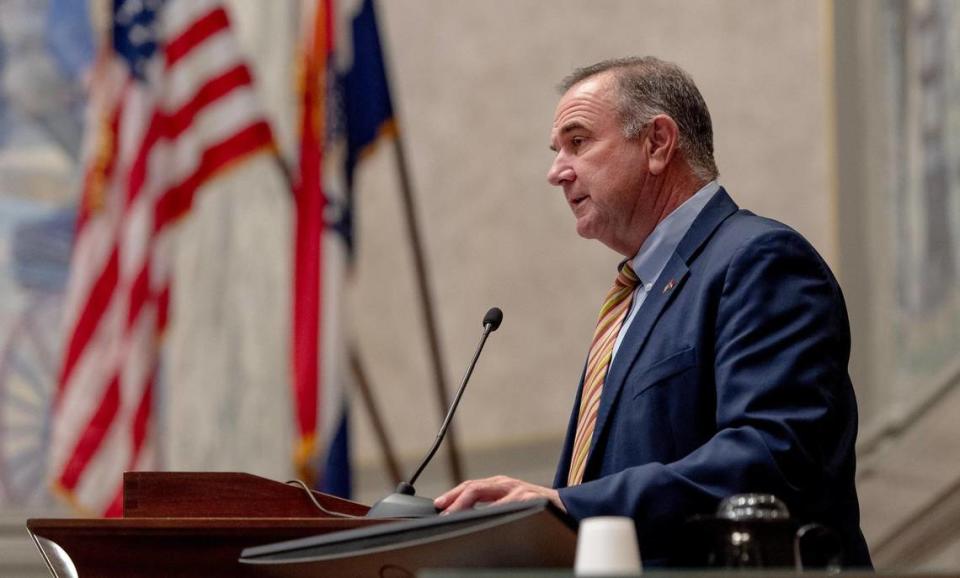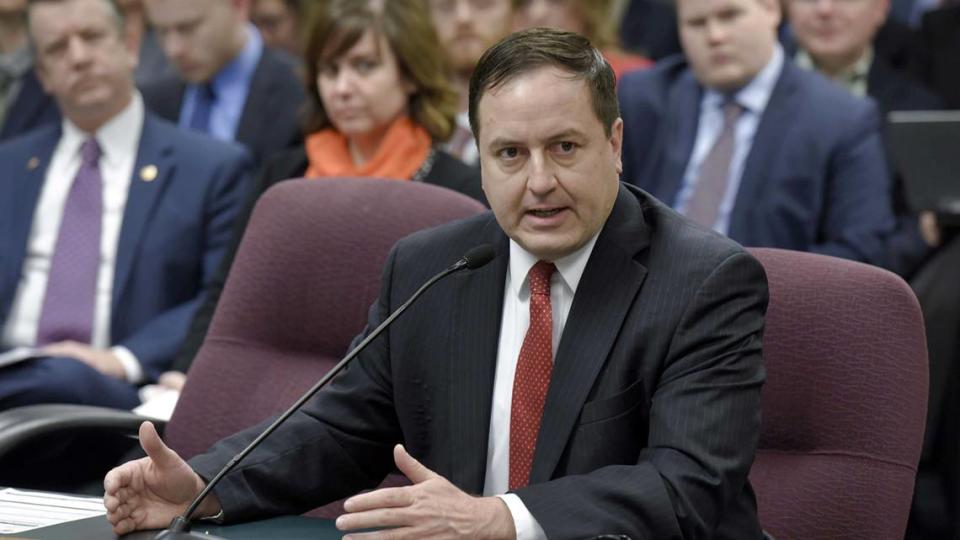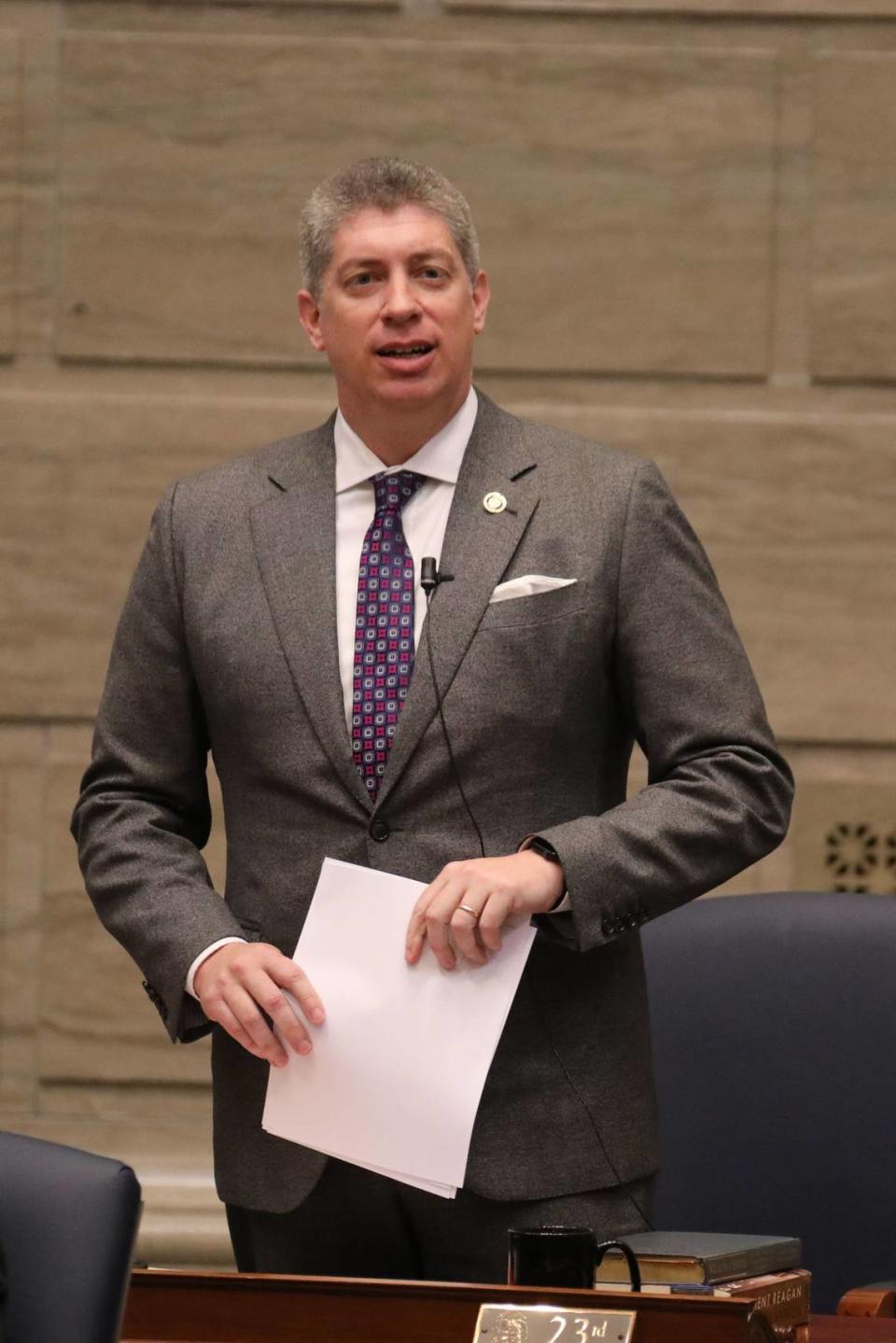MO governor’s race erupts over foreign-owned farmland after new restrictions fail to pass
When former Missouri Democratic Gov. Jay Nixon in 2013 vetoed a bill lifting a near-total ban on foreign ownership of agricultural land, the Republican-controlled General Assembly overrode him. Today, foreign entities own more than 100,000 acres across the state.
A decade later, that vote looms over the 2024 race for governor.
The veto override allowed foreign entities to own up to 1% of agricultural land and most proposals in the legislature now would either lower that threshold to 0.5% or reimpose the ban. Now, the major Republican candidates for governor all support tighter limits on foreign ownership or a new ban, reflecting how far the party has moved in 10 years.
As the Republican Party nationally has shifted away from support for free trade and adopted an increasingly hawkish stance toward China, foreign land ownership has become a political liability – and opportunity – ahead of the 2024 election.
Lt. Gov. Mike Kehoe was a state senator in 2013 and supported the veto override, but now backs new restrictions. Missouri Secretary of State Jay Ashcroft and state Sen. Bill Eigel, neither of whom were in the legislature at the time, also support limits but have fought over who has staked out the most aggressive position.
The General Assembly’s annual session ended last week with lawmakers failing to pass additional restrictions. Most big GOP priorities, including on agriculture, were blocked by filibusters and Republican infighting in the state Senate.
While lawmakers are expected to try again early next year, the collapse of the effort clears the way for foreign agricultural land ownership to play a central role in the Republican race for governor until at least January – a quiet but crucial period when candidates are courting donors and party activists ahead of the August 2024 primary election.
“There’s a long runway between now and next August as it relates to how inflation and the economy continue to impact Republican primary voters. But the foreign land ownership – it’s a big deal,” said James Harris, a Missouri Republican consultant.
Kansas lawmakers have also considered legislation aimed at restricting foreign-owned farmland. At the federal level, Sen. Josh Hawley, a Missouri Republican, and Sen. Jerry Moran, a Kansas Republican, have filed bills to ban foreign ownership. Florida Republican Gov. Ron DeSantis, who is expected to run for president, recently signed a ban for his state.
Foreign ownership of agricultural land was previously a flashpoint during last year’s U.S. Senate race in Missouri. A series of attacks highlighted then-Missouri Attorney General Eric Schmitt’s vote in favor of the 2013 law. Schmitt, who adopted an aggressive posture toward China during the campaign, easily defeated Democrat Trudy Busch Valentine 55% to 42%.
“It can be a potent issue, but I think Schmitt and his team proved that if you talk about other issues and get ahead of it, there’s a way to neutralize it or at least change the discussion matrix by which voters are making their decisions,” Harris said.
Just weeks after Missouri lawmakers approved the 2013 legislation, the Chinese-based Shuanghui International Holdings bought U.S.-based Smithfield Foods and scooped up roughly 40,000 acres in Missouri.
Smithfield Foods, now called the WH Group, owns over 146,000 acres of Missouri farmland, according to the Center for Strategic and International Studies, a national security think tank. In Missouri, foreign-held agricultural land grew by nearly 50,000 acres between 2019 and 2020, according to MOST Policy Initiative, a Jefferson City-based group that conducts bipartisan research on Missouri legislation.
Fight over farmland ban
Kehoe is likely to face the most direct attacks on the issue because of his 2013 vote. During a February radio interview, he said the 2013 vote had been to “put a cap on foreign ownership of land.” But while the bill did cap foreign ownership at 1%, the previous cap had been zero.
The Chinese Communist Party’s influence continues to grow and is one of the foremost national security threats to the United States, Kehoe said Thursday in a statement in response to questions from The Star.
Missouri should be doing “everything possible” to prevent the CCP and other foreign adversaries from buying Missouri farmland, especially around military installations, advanced manufacturing that plays a role in national defense and intelligence agencies, he said.
“I support the complete ban of land purchases by the CCP and other foreign adversaries, and strongly encourage both the House and Senate to address this critical national security matter when they return to Jefferson City,” Kehoe said.

Ashcroft this spring has attacked both Kehoe and Eigel over the issue of foreign land ownership.
Ashcroft began a late April column in The Joplin Globe by noting Kehoe’s 2013 vote. And in another column on Tuesday, he wrote that the Senate with Eigel’s help added a “loophole” into legislation that would have allowed entities associated with China, Iran, Venezuela, Russia and North Korea to buy as much land as they want as long as it wasn’t used for farming.
“Simply put there is one and only one reason why the legislature did not pass legislation prohibiting foreign ownership of Missouri land. They did not want to,” Ashcroft said in a statement to The Star on Thursday. “They wanted to claim credit on Facebook and social media but not actually do anything about it and we know this because of what the senate did do.”
The compromise package reached by legislative negotiators would have prohibited all foreign businesses, governments and undocumented immigrants from buying agricultural land. However, it would allow foreign-owned companies to continue owning land they have already purchased or acquired.
The measure didn’t contain a ban on foreign ownership of non-agricultural land, but some earlier proposals had explicitly prohibited any purchases by entities associated with China, Russia and other American adversaries.
“And I am certain that if I had not stood up and loudly proclaimed the truth about that bill they would have passed a bill allowing our enemies to buy whatever Missouri land they want and claimed that they had stopped it,” Ashcroft said.

Since the session ended, Eigel has moved to keep attention on the issue by calling on Gov. Mike Parson, a Republican who as a state senator supported the 2013 override, to call a special session on foreign ownership. In a letter to Parson, Eigel asks him to consider SB 9 as a model bill for a possible session.
The bill, sponsored by Eigel, would have prohibited foreign entities — both individuals and businesses — from purchasing any real estate – not just farmland.
“Governor, we cannot afford to wait until January to address this important issue,” Eigel wrote. “Our farmers and ranchers deserve to know that we have their back and that we aren’t going to let foreign interests buy up our farmland and put Missouri farmers out of business.”
Eigel didn’t respond to a call Thursday. A Parson spokeswoman didn’t respond to a request for comment.

Restrictions enjoy bipartisan support
Despite the infighting, some form of additional restrictions on foreign ownership enjoys bipartisan support within the General Assembly. One proposal passed the Missouri House in March with just three no votes.
No major Democrat has entered the race for governor so far – Democrats face increasingly steep odds in statewide races in Missouri. But House Minority Leader Crystal Quade, a Springfield Democrat, has said she is considering a campaign.
Asked Friday why the legislature hadn’t passed a bill, Quade said bills don’t advance for numerous reasons but suggested special interests were to blame. “And if you look where the money comes from, I would say that plays a very big role,” she said.
A handful of business and industry groups, including Missouri Realtors and the Missouri Pork Association, oppose the legislation.
“Having the government tell you whom you can sell your property to is a bad idea,” Sam Licklider, a lobbyist for Missouri Realtors, said in a message to members earlier this month.
Missouri lawmakers have vowed to take up the legislation again next year, when elections will only be months away. It’s unclear whether that will help or harm its prospects.
House Speaker Dean Plocher, a St. Louis Republican, said last Friday the issue is difficult. While lawmakers don’t want the “evil empires of the world” controlling Missouri farmland, they also recognize Missouri has good foreign investors from countries such as Canada, Great Britain and Israel, he said.
The problem, he said, is how to draft a bill that accomplishes both those goals.
“We want to protect Missouri farmland. We want to protect our crops. We want to have secure food,” Plocher said. “And there’s a way to do it, we believe.”
Correction: A previous version of this story misstated the author of a column in the Joplin Globe.

 Yahoo Movies
Yahoo Movies 
